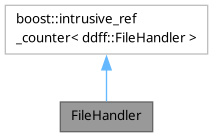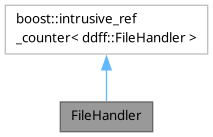Object to open and manage a logging file, low-level API. More...
#include <FileHandler.hxx>


Classes | |
| struct | read_job |
| Read jobs, need requester and the offset. More... | |
| struct | StreamSetInfo |
| Collection of data per stream. More... | |
Public Types | |
| enum class | Mode { New , Truncate , Append , Any , Read } |
| Mode for opening the file. More... | |
| typedef std::ios::off_type | pos_type |
| Use the position type of ios streams. | |
| typedef boost::intrusive_ptr< FileHandler > | pointer |
| Pointer type to preferably use. | |
Public Member Functions | |
| FileHandler (const std::string &fname, Mode mode=Mode::Truncate, unsigned blocksize=4096U) | |
| Constructor for an object managing a ddff log file. | |
| FileHandler () | |
| Default constructor, requires the open() call to be useful. | |
| void | open (const std::string &fname, Mode mode=Mode::Truncate, unsigned blocksize=4096U) |
| Open, after using a default constructor. | |
| virtual | ~FileHandler () |
| Destructor. | |
| FileStreamWrite::pointer | createWrite (size_t bufsize=0) |
| Create a new write stream. | |
| FileStreamWrite::pointer | attachWrite (unsigned sid, size_t bufsize=0) |
| Attach to an existing write stream, only possible if that stream has no writer (i.e., after analysis of an existing file) | |
| unsigned | processWrites () |
| Write available buffers to file. | |
| virtual void | syncToFile (bool intermediate=true) |
| Perform an intermediate flush. | |
| bool | isExtending () |
| Return true if the file existed before. | |
| bool | isComplete () const |
| check that the filer is correctly configured. | |
| unsigned | getBlockSize () const |
| return the blocksize used in this file | |
| FileStreamRead::pointer | createRead (unsigned stream_id, unsigned num_cache=3U, bool slice_indexed=false) |
| Create a read stream. | |
| void | runLoads () |
| Force a load in the calling thread. | |
| void | checkIndices (pos_type offset=0) |
| Check the indices in the file. | |
| virtual void | bufferWriteInformation (pos_type offset, DDFFMessageBuffer::ptr_type buffer) |
| Callback, informing about where a block/buffer is written. | |
| void | requestFileStreamReadRelease (FileStreamRead::pointer &ptr) |
| Inform of destruction of a filestreamRead object. | |
| unsigned long | getFileSize () const |
| Give an (approximate) size of the file. | |
Static Public Attributes | |
| static constexpr std::ios::off_type | pos_type_max |
| Max pos type is used to mark "infinite"/undefined. | |
Protected Types | |
| typedef std::vector< StreamSetInfo > | streams_t |
| List of issued writers and readers. | |
Protected Attributes | |
| unsigned | blocksize |
| Gross size of file blocks. | |
| streams_t | streams |
| List of issued writers. | |
| AsyncList< FileStreamWrite * > | write_jobs |
| FIFO with writing work to do. | |
| AsyncList< read_job > | read_jobs |
| FIFO with loading work to do. | |
| pos_type | offset |
| Give current write offset in the file. | |
| std::string | filename |
| File name, to remember. | |
| std::fstream | file |
| File stream. | |
| Mode | open_mode |
| Open mode. | |
| bool | file_existing |
| Is this a new file ? | |
Friends | |
| class | FileStreamWrite |
| Calls for fileStreamWrite. | |
| class | FileStreamRead |
| Calls for fileStreamRead. | |
Detailed Description
Object to open and manage a logging file, low-level API.
This handles a file in the DelftDataFormat file format, which can contain multiple data streams. A "stream" is implemented as a series of linked blocks in this file.
This class can return a writer for a new stream, or readers for a given stream.
File format
Block sizes are a multiple of a base block size, default 4096 bytes, and for best performance chosen to match (be a multiple of) physical device block size.
Each block has a 28-byte header, indicating next block location, block size, fill level, block number, stream id, checksum, etc. For the precise format see the description in ControlBlock.hxx. The remainder of the block contains data.
Reading a stream
For a stream, the starting block for reading is loaded with a FileStreamRead object. This object needs the offset of the first (or a later) block in the stream.
A FileStreamRead object can issue an iterator, initially using the first loaded block of data (excluding the header). When the iterator reaches the end of the data in the loaded block, the next block, if available, will be loaded and used. To improve real-time performance, it is also possible to pre-load blocks of data.
Before or after opening an existing file, create all needed read streams, and run checkIndices.
Writing a stream
A FileStreamWrite object can write a stream. It can issue an iterator, and will request file blocks from the FileHandler when needed.
Alternating reading and writing.
A file can be used for both reading and writing. After writing, an intermediate end can be written to a file by calling the syncToFile() function. A following call to runLoads() re-loads the necessary data into the FileStreamRead objects, which can then be used to read data.
Further interface.
A further elaboration of the interface is given in the dueca::ddff::FileWithInventory class. Here the #0 stream is reserved for information on named data streams, and the #1 stream is reserved for recording block offsets at points where stream reading may be started.
Error robustness and recovery
All blocks carry a checksum, calculated over the data and metadata (with the exception of the next block location). The metadata also contains (if so notified by the application) the offset for the first completely written written object in a block, where "object" can be defined by the application. This should enable partial recovery of data in the case of data corruption.
Member Enumeration Documentation
◆ Mode
|
strong |
Mode for opening the file.
Constructor & Destructor Documentation
◆ FileHandler()
| FileHandler::FileHandler | ( | const std::string & | fname, |
| Mode | mode = Mode::Truncate, | ||
| unsigned | blocksize = 4096U ) |
Constructor for an object managing a ddff log file.
- Parameters
-
fname Name for the file mode Open mode, see FileHandler::Mode blocksize File block size. It is advised to let this match your platform's physical block size. Note that write streams can use a buffer equal to or a multiple of the block size chosen here.
◆ ~FileHandler()
|
virtual |
Destructor.
This will write any remaining blocks and close the file
Member Function Documentation
◆ createWrite()
| FileStreamWrite::pointer FileHandler::createWrite | ( | size_t | bufsize = 0 | ) |
Create a new write stream.
- Parameters
-
bufsize Size of the buffers in this stream. Should be a multiple of the handler's blocksize.
- Returns
- Pointer to the write object.
◆ attachWrite()
| FileStreamWrite::pointer FileHandler::attachWrite | ( | unsigned | sid, |
| size_t | bufsize = 0 ) |
Attach to an existing write stream, only possible if that stream has no writer (i.e., after analysis of an existing file)
- Parameters
-
sid Stream ID. bufsize Requested size for buffers, takes default otherwise.
- Returns
- Pointer to the write object.
◆ processWrites()
| unsigned FileHandler::processWrites | ( | ) |
Write available buffers to file.
Buffers that have been offered to the handler as complete are written to file at this call.
- Returns
- number of processed writes
◆ syncToFile()
|
virtual |
Perform an intermediate flush.
All writers are checked for partial buffers, these are pushed to for writing and then written to file. Further writing in these buffers is possible when intermediate is set to true.
- Parameters
-
intermediate Perform an intermediate flush; after this further writes are still possible.
◆ isComplete()
| bool FileHandler::isComplete | ( | ) | const |
check that the filer is correctly configured.
- Returns
- True, if opened.
◆ createRead()
| FileStreamRead::pointer FileHandler::createRead | ( | unsigned | stream_id, |
| unsigned | num_cache = 3U, | ||
| bool | slice_indexed = false ) |
Create a read stream.
Note that each stream_id can only have one read object. The object is only initialised after a checkIndices() call, at which point the file is read and information on the blocks for this stream is provided.
- Parameters
-
stream_id Given id. num_cache Preference for the number of cached blocks. slice_indexed Indexing is per data slice, the stream stores segments or slices of this data type.
- Returns
- A
◆ runLoads()
| void FileHandler::runLoads | ( | ) |
Force a load in the calling thread.
Note that this may block and use a lock. For real-time operation, loads should happen on request, and with enough lead time so that needed data is available in buffers. If a read from a stream is attempted and the data is not loaded, the runLoads() call will be called upon the read attempt.
◆ checkIndices()
| void FileHandler::checkIndices | ( | pos_type | offset = 0 | ) |
Check the indices in the file.
This runs through an opened file, and checks block sizes and stream ID's. Any reported FileStreamRead objects matching the ID's will get notified of the file offsets of the blocks.
◆ requestFileStreamReadRelease()
| void FileHandler::requestFileStreamReadRelease | ( | FileStreamRead::pointer & | ptr | ) |
Inform of destruction of a filestreamRead object.
Note that after this call the FileStreamRead object is no longer effective, and should be released.
Member Data Documentation
◆ pos_type_max
|
staticconstexpr |
Max pos type is used to mark "infinite"/undefined.
The documentation for this class was generated from the following file:
- /home/abuild/rpmbuild/BUILD/dueca-4.2.5-build/dueca-4.2.5/ddff/FileHandler.hxx